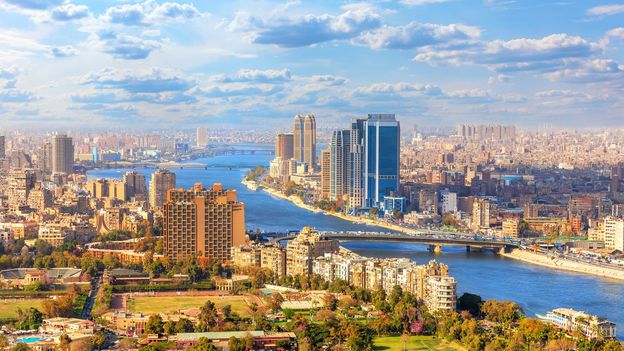Launched in February 2016, National Strategy for Sustainable Development: Egypt’s Vision 2030 is a national agenda aimed at fostering sustainable development across the country by improving the quality of life for residents and addressing key principles such as economic growth, social equity, and climate change.
The idea of sustainable development, which emphasizes balancing economic growth with social equity and environmental protection, is at the heart of Vision 2030.
Since launching Vision 2030, the government has been implementing a universal healthcare system to provide all citizens with essential services. President Abdel Fattah Al-Sisi has initiated the first phase of the national health insurance project in several governorates, including Port Said, Ismailia, Suez, and North and South Sinai.
Key objectives include eliminating waiting lists for critical surgeries within six months, developing 47 model hospitals across Egypt, and providing comprehensive treatment for Hepatitis C for 45 million citizens in partnership with pharmaceutical companies over two years. Additionally, it seeks to reform the healthcare system to enhance social solidarity and reduce household spending on health, with costs covered for families unable to pay.
In 2018, Egypt updated its vision to adapt to global changes and trends, including advancements in technology, shifts in economic markets, and evolving social needs.
The process involved discussions with various stakeholders, including the Ministry of Housing, Utilities and Urban Communities, the Ministry of Social Solidarity, businesses like Orascom Construction, and NGOs such as the Egyptian Red Crescent.
Three Key Principles
Vision 2030 is built on three key principles: economic growth, social equity, and climate change.
First, it emphasizes a human-centered approach to development, prioritizing the well-being of citizens by designing policies that enhance everyday life. A prime example is the Alternative Housing Project in October Gardens, a significant government initiative addressing the displacement of residents due to various development projects. This project aims to provide better living conditions for residents of informal settlements in Giza, particularly those from low-income families whose homes have been demolished.
By focusing on affordable housing, the government is investing to improve living standards and promote social stability in the region through targeted investments in housing initiatives.
Second, the principle of equity and accessibility ensures all segments of society receive fair access to services, evident in initiatives like the Takaful and Karama (Solidarity and Dignity) program, which provides financial support to vulnerable families, helping them meet their basic needs.
The third principle, resilience and adaptation, focuses on preparing for global challenges, particularly climate change. Egypt is investing in renewable energy sources, such as solar and wind power, to reduce reliance on fossil fuels. The Benben Solar Park is one of the largest in the world, aiming to provide clean energy and create jobs in the region.
Ultimately, sustainability involves addressing the needs of the present without jeopardizing those of future generations. It is evident in initiatives aimed at preserving natural resources, such as water conservation projects focused on managing Egypt’s limited water supply. In light of Egypt’s water scarcity challenges, sustainability takes on added importance, particularly due to the impending water crisis further challenged by the Grand Ethiopian Renaissance Dam (GERD).
Egypt relies heavily on the Nile River for its water supply, and the construction of the GERD has raised concerns about reduced water flow. This situation threatens agricultural productivity, availability of drinking water, and overall economic stability.
Strategic Goals of Egypt’s Vision 2030
Vision 2030 outlines six strategic goals to improve life in Egypt.
One key goal is to enhance the quality of life by improving access to healthcare and education. The government is actively working towards this by expanding health insurance coverage for all citizens, ensuring that more individuals can receive the necessary medical care.
Another goal is to promote social justice and equality by reducing disparities among different groups, particularly in light of Egypt’s approximately 29.7 percent poverty rate.
Additionally, initiatives that empower women in the workforce, such as training programs and support for female entrepreneurs, aim to foster greater gender equality in business.
A diverse economy is another goal, as the government seeks to create a competitive environment that encourages innovation, exemplified by the establishment of technology parks like the Smart Village in Cairo, which aim to attract tech companies and foster a vibrant startup culture.
Notably, Egypt is set to launch trial operations of its monorail project in October, which will utilize eco-friendly electric energy to lower fuel consumption and reduce pollution rates. This initiative complements the expansion of the Cairo Metro, enhancing transportation efficiency for millions of residents.
To track progress, Egypt’s Vision 2030 includes specific targets and performance indicators, allowing the government to regularly assess its achievements and make necessary adjustments.







Comments (0)